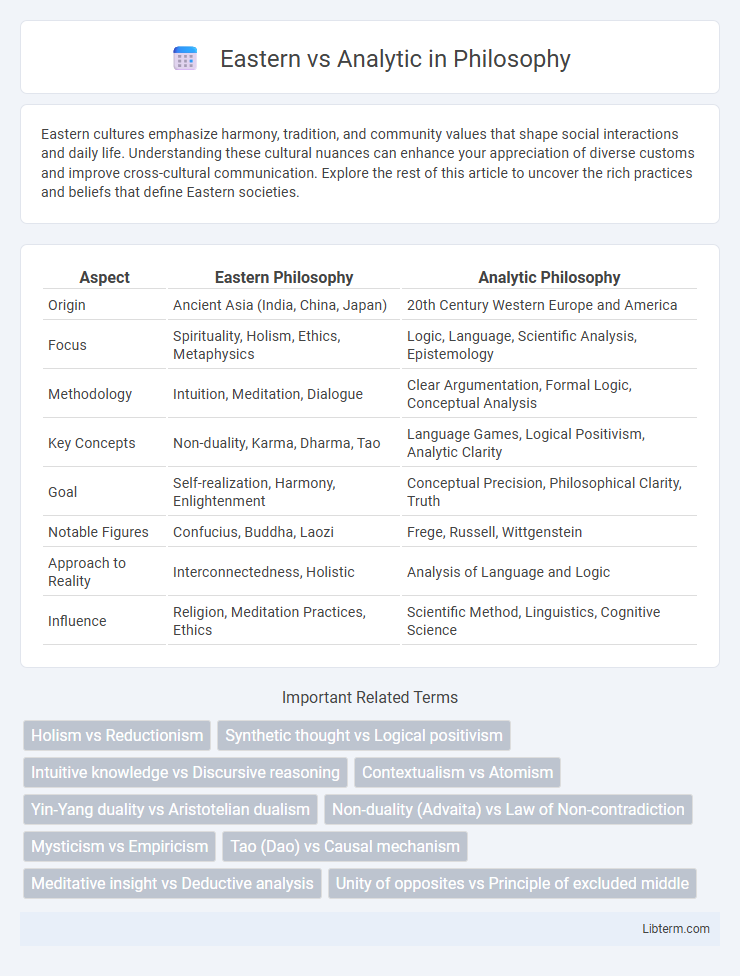Eastern cultures emphasize harmony, tradition, and community values that shape social interactions and daily life. Understanding these cultural nuances can enhance your appreciation of diverse customs and improve cross-cultural communication. Explore the rest of this article to uncover the rich practices and beliefs that define Eastern societies.
Table of Comparison
| Aspect | Eastern Philosophy | Analytic Philosophy |
|---|---|---|
| Origin | Ancient Asia (India, China, Japan) | 20th Century Western Europe and America |
| Focus | Spirituality, Holism, Ethics, Metaphysics | Logic, Language, Scientific Analysis, Epistemology |
| Methodology | Intuition, Meditation, Dialogue | Clear Argumentation, Formal Logic, Conceptual Analysis |
| Key Concepts | Non-duality, Karma, Dharma, Tao | Language Games, Logical Positivism, Analytic Clarity |
| Goal | Self-realization, Harmony, Enlightenment | Conceptual Precision, Philosophical Clarity, Truth |
| Notable Figures | Confucius, Buddha, Laozi | Frege, Russell, Wittgenstein |
| Approach to Reality | Interconnectedness, Holistic | Analysis of Language and Logic |
| Influence | Religion, Meditation Practices, Ethics | Scientific Method, Linguistics, Cognitive Science |
Understanding Eastern vs Analytic Thought
Eastern thought emphasizes holistic perspectives, interconnectedness, and context, promoting harmony and balance within complex systems. Analytic thinking prioritizes logical reasoning, categorization, and objective analysis, focusing on discrete components and formal rules. Recognizing these cognitive styles enhances cross-cultural communication and problem-solving by integrating broad contextual awareness with precise, critical evaluation.
Historical Roots of Eastern and Analytic Philosophies
Eastern philosophy traces its origins to ancient civilizations such as India, China, and Japan, deeply rooted in spiritual and metaphysical traditions like Hinduism, Buddhism, and Confucianism that emphasize holistic understanding and inner harmony. Analytic philosophy emerged in early 20th-century Western Europe and North America, rooted in the works of thinkers like Bertrand Russell and Ludwig Wittgenstein, focusing on logic, language analysis, and clarity of argument. The historical divergence reflects Eastern philosophy's emphasis on experiential wisdom and interconnectedness, contrasting with analytic philosophy's prioritization of linguistic precision and logical rigor.
Core Principles of Eastern Philosophy
Eastern philosophy centers on holistic concepts such as interconnectedness, balance, and the harmony between humanity and nature, emphasizing the unity of all existence. It prioritizes experiential knowledge through meditation, self-awareness, and intuitive insight rather than purely logical analysis. Core principles include mindfulness, impermanence, and the cyclical nature of life, contrasting with the linear, compartmentalized approach typical of analytic philosophy.
Fundamental Concepts in Analytic Philosophy
Analytic philosophy emphasizes clarity, logical rigor, and linguistic analysis, focusing on concepts like language, meaning, and knowledge. Foundational figures such as Frege, Russell, and Wittgenstein shaped its approach to precise argumentation and the breakdown of philosophical problems into logical components. In contrast, Eastern philosophy often centers on holistic understanding, interconnectedness, and experiential insights, diverging from the analytic tradition's methodical examination of language and thought.
Comparing Approaches to Knowledge and Truth
Eastern philosophies emphasize holistic understanding, valuing intuition, interconnectedness, and experiential wisdom to approach knowledge and truth. Analytic traditions prioritize formal logic, clarity, and empirical evidence, dissecting concepts through rigorous argumentation and linguistic analysis. The contrast reveals Eastern thought's fluid, context-dependent truth alongside Analytic philosophy's structured, objective pursuit of factual precision.
Logic and Reasoning: East vs Analytic
Eastern logic emphasizes holistic reasoning, valuing context, relationships, and interconnectedness, often using dialectical approaches that accommodate contradictions and paradoxes. Analytic logic prioritizes formal systems, clear definitions, and structured argumentation, relying heavily on symbolic logic and rigorous proof methods. These contrasting methodologies reflect foundational differences in how reasoning and truth are conceptualized within Eastern philosophies versus Western analytic traditions.
Influences on Ethics and Morality
Eastern ethics emphasizes harmony, balance, and community well-being, deeply influenced by Confucianism, Buddhism, and Taoism, which promote interconnectedness and the importance of collective moral duties. Analytic traditions prioritize logical reasoning, individual autonomy, and clear ethical principles rooted in Western philosophy, drawing from thinkers like Kant and Mill who focus on universal moral rules and individual rights. These differing frameworks shape how cultures approach moral dilemmas, with Eastern views favoring relational ethics and analytic approaches stressing rational justification and consistency.
Language and Meaning in Both Traditions
Eastern traditions often emphasize holistic language interpretations, viewing meaning as context-dependent and interconnected with cultural and spiritual dimensions. Analytic traditions prioritize precise linguistic analysis, focusing on logical structure, syntax, and often formal semantics to clarify and dissect meaning. While Eastern thought integrates language with lived experience and intuition, analytic philosophy seeks clarity through rigorous argumentation and definitional boundaries.
Impacts on Modern Society and Science
Eastern philosophies, such as Buddhism and Confucianism, emphasize holistic understanding, interconnectedness, and balance, influencing modern approaches to mental health and environmental sustainability. Analytic philosophy prioritizes logical clarity, rigorous argumentation, and language analysis, shaping contemporary science, technology, and formal logic frameworks. The integration of Eastern holistic perspectives with analytic precision increasingly informs interdisciplinary research, enhancing problem-solving and innovation in modern society.
Bridging Eastern and Analytic Perspectives
Bridging Eastern and Analytic perspectives involves integrating holistic Eastern philosophies, which emphasize interconnectedness and intuition, with the logical rigor and clarity of Analytic philosophy. This synthesis enhances understanding by combining metaphysical depth with precise argumentation, fostering innovative approaches to consciousness, ethics, and epistemology. Collaborative dialogues between these traditions promote a comprehensive worldview that transcends cultural and methodological boundaries.
Eastern Infographic

 libterm.com
libterm.com